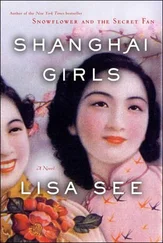Lisa See - Peony in Love
Здесь есть возможность читать онлайн «Lisa See - Peony in Love» весь текст электронной книги совершенно бесплатно (целиком полную версию без сокращений). В некоторых случаях можно слушать аудио, скачать через торрент в формате fb2 и присутствует краткое содержание. Жанр: Старинная литература, на английском языке. Описание произведения, (предисловие) а так же отзывы посетителей доступны на портале библиотеки ЛибКат.
- Название:Peony in Love
- Автор:
- Жанр:
- Год:неизвестен
- ISBN:нет данных
- Рейтинг книги:4 / 5. Голосов: 1
-
Избранное:Добавить в избранное
- Отзывы:
-
Ваша оценка:
- 80
- 1
- 2
- 3
- 4
- 5
Peony in Love: краткое содержание, описание и аннотация
Предлагаем к чтению аннотацию, описание, краткое содержание или предисловие (зависит от того, что написал сам автор книги «Peony in Love»). Если вы не нашли необходимую информацию о книге — напишите в комментариях, мы постараемся отыскать её.
Peony in Love — читать онлайн бесплатно полную книгу (весь текст) целиком
Ниже представлен текст книги, разбитый по страницам. Система сохранения места последней прочитанной страницы, позволяет с удобством читать онлайн бесплатно книгу «Peony in Love», без необходимости каждый раз заново искать на чём Вы остановились. Поставьте закладку, и сможете в любой момент перейти на страницу, на которой закончили чтение.
Интервал:
Закладка:
I waited outside the gate until he left the compound. To me, he was the same: man-beautiful. I relished his scent, his voice, his very presence. I attached myself to his shoulders so I could be pulled along as he went to a bookshop and later gave a talk to a gathering of men. Afterward, he was restless and unsettled. He spent the rest of the night drinking and gambling. I followed him when he went home. His bedchamber had been left untouched since Ze’s death. Her zither rested in its stand in the corner.
Her perfumes, brushes, and hair ornaments collected dust and spider silks on her dressing table. He stayed up late, pulling her books from the shelves and opening them. Was he thinking of her or me or both of us?
Ren slept until after lunch, woke up, and repeated the exact same pattern as the day before. Then, on Double Seven, on what would have been my twenty-eighth birthday, Ren spent the afternoon with his mother. She ( 2 0 8 )
read poetry to him. She poured his tea. She patted his sad face. By now I was sure he was remembering me.
After his mother went to bed, Ren once again looked through Ze’s books. I went back to my old place in the rafters, where my feelings of regret and remorse about Ren, Ze, and my own life and death rippled through me in wave upon wave. I’d failed in so many ways, and now seeing my poet like this—opening one book after another, his mind far into the past—hurt beyond measure. I closed my eyes against the pain of what I was seeing. I put my hands over my ears, which had never adapted to the sounds of the earthly realm, but I could still hear pages turning, each one a reminder of what Ren and I had lost.
When he moaned below me, the sound tore through my body. I opened my eyes and looked down. Ren sat on the edge of the bed, holding two sheets of paper, the book that they’d come from open next to him.
I slipped straight down and came to rest at his side. He held the two pages Ze had so cruelly ripped out of our shared copy of The Peony Pavilion that described how our commentary had been written. Here was the proof Ren needed to know that Ze and I had worked together. I was delighted, but Ren didn’t look happy or relieved in any way.
He folded the papers, tucked them into his tunic, and set out into the night with me hanging on to his shoulders. He pushed his way through the streets until he came to a house I didn’t know. He was let in and led to a room filled with men, who were waiting for their wives to finish their Double Seven customs and games so they could sit down to their banquet.
The air was thick with smoke and incense, and at first Ren didn’t recognize anyone. Then Hong Sheng, who had been at Ren’s niece’s house the day I had gone on my first ever excursion, stood and came forward. Seeing that Ren was not there for the festivities, Hong Sheng picked up an oil lamp with one hand and two cups and a bottle of wine with the other, and the two men walked outside to a pavilion on the property and sat down.
“Have you eaten?” Hong Sheng asked.
Ren politely declined and then began, “I have come—”
“Baba!”
A little girl, still so young her feet hadn’t been bound, came running into the pavilion and climbed into Hong Sheng’s lap. I remembered seeing the poet’s wife pregnant with this child.
“Shouldn’t you be with your mother and the others?” Hong Sheng asked.
( 2 0 9 )
The child squirmed her indifference to the games of the inner chamber. She reached up, put her arms around her father’s neck, and buried her face in his shoulder.
“All right then,” Hong Sheng said, “you can stay, but you must be quiet, and when your mother comes you’ll have to go back with her. No arguments. No tears.”
How many times had I sought refuge with my father? Was this girl as wrong about her father as I’d been about mine?
“Do you remember a few years ago when we visited my cousin’s home?” Ren asked. “Cousin Shen and the others had read the commentary on The Peony Pavilion. ”
“I’d read it too. I was very impressed by your work. I still am.”
“That day I told everyone I hadn’t written it.”
“You remain modest. It’s a good quality.”
Ren pulled out the two sheets of paper and gave them to his friend.
The poet tilted them to the lamplight and read. When he was done, he looked up, and asked, “Is this true?”
“It was always true, but no one would listen.” Ren hung his head.
“Now I want to tell everyone.”
“What good will it do if you change the story now?” Hong Sheng asked. “You will appear a fool at best and a man who is trying to promote women’s fame at worst.”
Hong Sheng was right. What I thought was a wonderful discovery locked Ren further into sadness and despair. He picked up the bottle of wine, poured himself a cup, and drained it. When he grabbed the bottle again, Hong Sheng took it from his hand.
“My friend,” he said, “you need to get back to your own work. You need to forget about your suffering and the tragedies of that girl and your wife.”
If Ren forgot, what would happen to me? But keeping us in his heart was torturing him. I’d seen this in his loneliness, his drinking, and in the way he handled Ze’s books so lovingly. Ren had to get over his grief and forget about us. I left the pavilion, wondering if I would ever see him again.
A sliver of moon hung in the night sky. The air was damp and warm. I walked and walked, believing each step would take me farther into exile. I watched the sky the whole night, and I never saw the Weaving Maid and her Cowherd meet. And I didn’t know what Ren did with those two pages.
( 2 1 0 )
.
.
.
j u st one we e k later, the Festival of Hungry Ghosts arrived. After so many years, I knew what I was and what I needed to do. I pushed. I shoved. I stuffed my mouth with whatever I could grab. I went from house to house. And as usual, as if I could have changed where I went even if I wanted to, I found myself again in front of the Chen Family Villa.
I had my face in a bowl of melon rinds so old they’d gone soft and slimy when I heard someone call my name. I growled, spun around, and came face-to-face with my mother.
Her cheeks were painted white and she was dressed in layer upon layer of the finest silk. She recoiled when she saw it truly was me. Terror filled her eyes. She threw spirit money at me and took several steps back, tripping over her train.
“Mama!” I hurried to her side and helped her to her feet. How could she possibly see me? Had a miracle happened?
“Stay away!” She threw more money at me, which the other nether creatures scrambled to grab for themselves.
“Mama, Mama—”
She started to edge away again, but I stayed with her. Her back came up against the wall of the compound across the street. She looked from side to side, hoping to find a way to escape, but she was surrounded by those who wanted more money.
“Give them what they want,” I said.
“I have nothing more.”
“Then show them.”
Mama held out her empty hands, and then reached into her clothes to show them she had nothing hidden beyond a couple of fish-shaped locks.
The other ghosts and creatures—driven by their hunger—turned away and scurried back to the altar table.
I reached out to touch her cheek. It was soft and cold. She closed her eyes. Her whole body shook with fright.
“Mama, why are you out here?”
She opened her eyes and looked at me in bewilderment.
“Come with me,” I said.
I led her by the elbow to the corner of our compound. I looked down.
Neither of us cast shadows, but I refused to take in the knowledge. I arced out wide to navigate the corner by the shore. When I saw our feet left no prints in the soft mud, nor did our skirts get dirty, I shut my heart to what ( 2 1 1 )
Читать дальшеИнтервал:
Закладка:
Похожие книги на «Peony in Love»
Представляем Вашему вниманию похожие книги на «Peony in Love» списком для выбора. Мы отобрали схожую по названию и смыслу литературу в надежде предоставить читателям больше вариантов отыскать новые, интересные, ещё непрочитанные произведения.
Обсуждение, отзывы о книге «Peony in Love» и просто собственные мнения читателей. Оставьте ваши комментарии, напишите, что Вы думаете о произведении, его смысле или главных героях. Укажите что конкретно понравилось, а что нет, и почему Вы так считаете.












